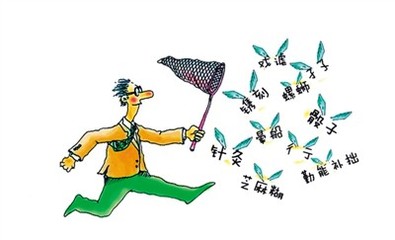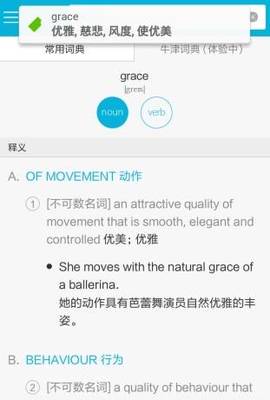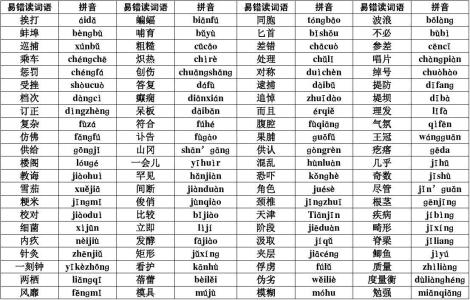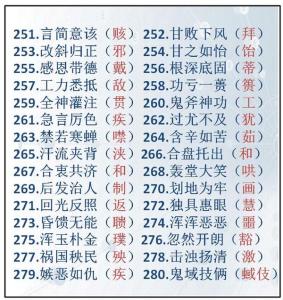1. damage, destroy, ruin
damage, destroy 和 ruin 这三个单词均表示"破坏"、"损坏"的意思,但各自的含义和用法不同。
①damage指部分"损坏"、"损害"、"破坏"或指使用价值有所降低。它可以用作动词,也可以用作名词,用作名词时常与to something 连用。例如:
Hundreds of houses in the area were damaged by the storm. 暴风雨毁坏了这个地区数以百计的房屋。
The accident did a lot of damage to his car. 这次车祸使他的车受到很大的损坏。
②destroy 只能用作动词,指彻底破坏,以致不可能修复,常作"破坏"、"毁灭"解,也可以指希望、计划等打破。例如:
The earthquake destroyed almost the whole town. 地震几乎毁灭了整个城镇。
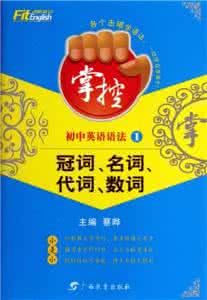
His hope of being a writer was destroyed. 他想成为一个作家的希望破灭了。
③ruin则表示破坏严重,以致不能修复,但这种破坏不像destroy那样毁灭某物,而是强调致使该物的使用价值发生了问题。用作动词时,它作"使毁灭"、"使崩溃"、"弄糟"解;用作名词时,它表示"毁灭"、"瓦解"、"废墟"等抽象概念。ruin也有借喻的用法。例如:
The fire ruined the castle. 那场大火使城堡夷为废墟。
The house has fallen into ruin. 房子倒塌了。
The company is facing ruin. 这家公司面临破产。
2. divide, separate
divide 和 separate都表示"分开",但其意义不同。
①separate指把原来连在一起或靠近的"分隔"开来,也可指"离别"。如:
The Taiwan Straits separates Taiwan from Fujian. 台湾海峡把台湾和福建隔开了。
Please separate the white shirts from the colored ones.请把白衬衫与有颜色的衬衫分开。
We are separated for the present. 我们暂时离别。
②divide指把整体"划分"成若干份,其后接into, from, among (between), with等。如:
The island is divided into two parts.这个岛屿被分成两部分。
We divided the money equally.我们平分这钱。
被divide(分隔)的东西在一定的条件下具有统一性,被separate(分隔)的东西没有统一性。如:
The Pacific separates Asia from America.太平洋把亚洲和美洲隔开。
He divided the cake among the children.他把这块蛋糕分给了孩子们。
What about dividing yourselves into four groups? 把你们分成四个小组怎么样?
3. hurt, injure, harm, wound
hurt, injure, harm 和 wound 都有"伤"的意思,但各自的含义和用法不同。
①hurt普通用语,既可指肉体上的伤害,也可指精神上、感情上的伤害。如:
The driver hurt himself badly in the accident. 那位司机在这次事故中伤得很重。
She hurt her leg when she fell.她跌倒时,一条腿受了伤。
He felt hurt at your words.你的话使他很难过。
注意:指肉体上的伤害时,hurt可与badly, slightly, seriously等连用;但若指精神上的创伤,只能说very much/rather/deeply hurt。
②injure比hurt正式,hurt 多指伤痛。而injure则指损害健康、成就、容貌等,强调功能的损失。如:
A bullet injured his left eye. 一颗子弹伤了他的左眼。
Drinking can injure one's health. 喝酒对人的健康有害。
I hope I didn't injure her feelings.我希望没有伤害她的感情。
③harm用于肉体或精神上的伤害均可,有时可指引起不安或不便。还可用于抽象事物,尤其是指不道德的事情。如:
Don't harm your eyes by reading in dim light. 不要在昏暗的灯光下看书,以免损害眼睛。
I have never harmed anybody.我从未伤害过任何人。
There was a fire in our street, but no one was harmed. 我们街里曾发生过火灾,但没人受伤。
④wound 指枪伤、刀伤、刺伤等皮肉之伤,是出血的、严重的伤,特指战场上的受伤。它可以指肉体上的伤害。也可比喻指人们精神上的创伤。如:
The bullet wounded his arm. 子弹打伤了他的一只胳膊。
The robber wounded him with a knife.那个强盗用刀刺伤了他。
You have wounded his pride.你伤害了他的自尊心。
4. insist on, stick to, persist in
insist on, stick to和 persist in 都有"坚持"的意思,但其用法不同。
①insist on意思是"demand or maintain persistently","坚决要求","坚持认为"。是对要求、看法、意见或主张的"坚持"。"on"是介词,后面接名词也可接动名词作表语。如:
She insisted on her opinion at the meeting. 她在会上坚持自己的意见。
She insisted on going with us. 她坚持要和我们一起去。
注意:insist接that从句,有两种情况:
(a)表示"坚决认为(主张)",从句中用陈述语气。如:
The Arab insisted that he had never seen the camel. 阿拉伯人坚持说他从来没见过那头骆驼。
Though all his friends criticized him, he insisted he had done nothing wrong. 尽管所有的朋友都指责他,但他坚持认为自己没有做错事。
(b)表示"坚决要、坚决要求",这时从句谓语常用虚拟语气。如:
He insisted that she (should) go.他坚决要她去。
②"stick to"的意思是"persist in, not abandon",是对"愿望、原则、决定、诺言、意见、理想或某种理论"的坚持不渝。"to"是介词,接名词或动名词作宾语,不能接不定式。如:
We should stick to the study of Marxism-Leninism. 我们应当坚持研究马列主义。
We stick to what is right and correct what is wrong.我们坚持正确的,修正错误的。
③persist in 后面常接名词或动名词,表示对某种活动坚持不懈或对某种信念固执不改。如:
If you persist in breaking the law, you will go to prison. 如果你固执要犯法,你将会坐牢的。
He persisted in his own belief.他固守自己的信念。
比较:He insisted on playing another game.他一定要再玩一局(球)。(当他insist的时候,到底play了没有,本句没明示)
He persisted in practicing hour after hour. 他坚持练习了一小时又一小时。(当他persist的时候,practice的动作已经发生)
5. worth, worthy, worthwhile
worth, worthy 和 worthwhile 这三个词用作形容词时,都有"值得的"的意思,但各自的用法或搭配关系不同。
①worth是一个只能作表语的形容词,意为"值……的"、"相当于……的价值的"、"值得……的"、"有……的价值的"。由于它类似介词,须后接名词或主动语态的动名词(有被动的含义)作宾语。例如:
The used car is still worth $2,000.这辆二手车依然值2000美元。
Is the exhibition worth a visit/visiting? 这个展览会值得去参观吗?
②worthy可以作表语和定语。用作定语时,意思是"有价值的"、"值得尊敬的"、"应受到赏识的";用作表语时,意思是"值得……"、"应得到……的",其后常接of sth., 也可接不定式。
Guangzhou is worthy of a visit/to be visited. 广州值得去看一看。
He said he was not worthy to accept such honour. 他说他不应该接受这种荣誉。
The school has graduated many worthy young people. 这间学校培养了许多优秀的年轻人。
③worthwhile像worthy那样,既可以作表语,也可以作定语。它表示某事因为重要、有趣或受益大而值得去花时间、钱财或努力去做好,一般作"值得的"、"值得做的"、"有意义的"解。用作表语时,可以后接动名词或动词不定式。例如:
Hangzhou is a beautiful place, it is worthwhile going/to go there. 杭州是个美丽的地方,值得一去。
Helping old people is a worthwhile activity. 帮助老人是一项很有意义的活动。
Thank you for your worthwhile suggestion. 谢谢你提出的好建议。
练习:用所给词的正确形式填空:
1. He has ________ (damage, destroy, ruin) his health through drinking too much.
2. We should never ________(separate, divide) from the masses.
3. We won't do anything that will________ (hurt, injure, harm, wound) the cause of peace.
4. We shall________(insist on, stick to, persist in) the point that theory comes from practice.
5. Her achievements are ________(worth, worthy, worthwhile) of the highest praise.
key: 1. ruined 2. separate 3. harm 4. stick to 5. worthy
 爱华网
爱华网